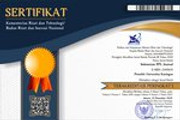NURTURING STUDENTS' WRITING NARRATIVE INTEREST THROUGH MIND MAPPING AND COOPERATIVE INTEGRATED READING AND WRITING
Abstract
Full Text:
PDFReferences
Alwasilah, C. (2011). Pokoknya kualitatif: Dasar-dasar merancang dan melakukan penelitian kualitatif. Bandung: Pustaka Jaya.
Argawati, N. O., & Suryani, L. (2017). Teaching writing using think-pair-share viewed from students risk taking. English Review: Journal of English Education, 6(1), 109-116. doi: 10.25134/erjee.v6i1.776.
Brown, H. D. (2005). Teaching by principles: An interactive approach to language pedagogy. New York: Longman Inc.
Buzan, T. (2012). The ultimate book of mind maps. Jakarta: Gramedia Pustaka Utama.
Cahyono, Y. B. (2009). Technique in teaching EFL writing. Malang: State University of Malang Press.
Cresswell, J. W. (2010). Research design: Qualitative & quantitative approaches. New Delhi: Sage Publications.
Emilia, E. (2008). Menulis tesis dan disertasi. Bandung: Alfabeta.
Fauziah, U. N. E. (2017). The use of mind mapping in generating students idea. Acuity: Journal of English Language Pedagogy, Literature, and Culture, 2(1), 45-60.
Gillies, R. M. (2016). Cooperative learning: Review of research and practice. Australian Journal of Teacher Education, 41(3).
Hamied, F. A., & Musthafa, B. (2016). Problematika pengajaran bahasa & sastra inggris di perguruan tinggi di Indonesia. Jakarta: Depdikbud.
Harmer, J. (2007). How to teach writing. Kuala Lumpur: Pearson Education Limited.
Inayah, R., & Rahayu, S. (2015). Exploring students difficulties in comprehending reading for academic material used in their class. Jurnal Ilmiah UPT P2M STKIP Siliwangi, 2(2), 240-245.
Johnson, D., & Johnson, R. (2009). An educational psychology success story: Social interdependence theory and cooperative learning. Educational Researcher, 38, 365 379.
Kagan, S., & Kagan, M. (2009). Kagan cooperative learning. San Clemente: Kagan Publishing.
Musthafa, B. (2010). Teaching English to young learners in Indonesia: Essential requirements. Educationist, 4(2), 120-125.
Musthafa, B. (2008). Teaching English to young learners: Principles and techniques. Bandung: UPI Press.
Nunan, D. (2003). Practical English language teaching. London: Mc Grow Hill.
Orlich, D. C., et al. (2007). Teaching strategies a guide to effective instruction. Boston: Houghton Mifflin Company.
Rahmah, U. (2017). The effectiveness of using mind mapping technique on students writing ability in descriptive text. Mini Thesis. Fakultas Pendidikan Bahasa. UIN SH.
Richard, J. C., & Willy, A. R. (2002). Methodology in language teaching: An anthology of current practice. Cambridge: Cambridge University Press.
Rizqiya, R. S., Pamungkas, M. Y., & Inayah, R. (2017). The use of power learning strategy to improve students writing competency. OKARA: Jurnal Bahasa dan Sastra, 11(2), 253-262.
Rodliyah, R. S. (2016). Using a facebook closed group to improve EFL students writing. Jurnal Ilmu Pendidikan, 82-101.
Yunus, M., & Hua Chien, C. (2016). The use of mind mapping strategy in Malaysian University English Test (MUET) writing. Creative Education, 7, 619-626. doi: 10.4236/ce.2016.74064.
DOI: https://doi.org/10.25134/ieflj.v5i2.1781
Refbacks
- There are currently no refbacks.

This work is licensed under a Creative Commons Attribution-ShareAlike 4.0 International License.

